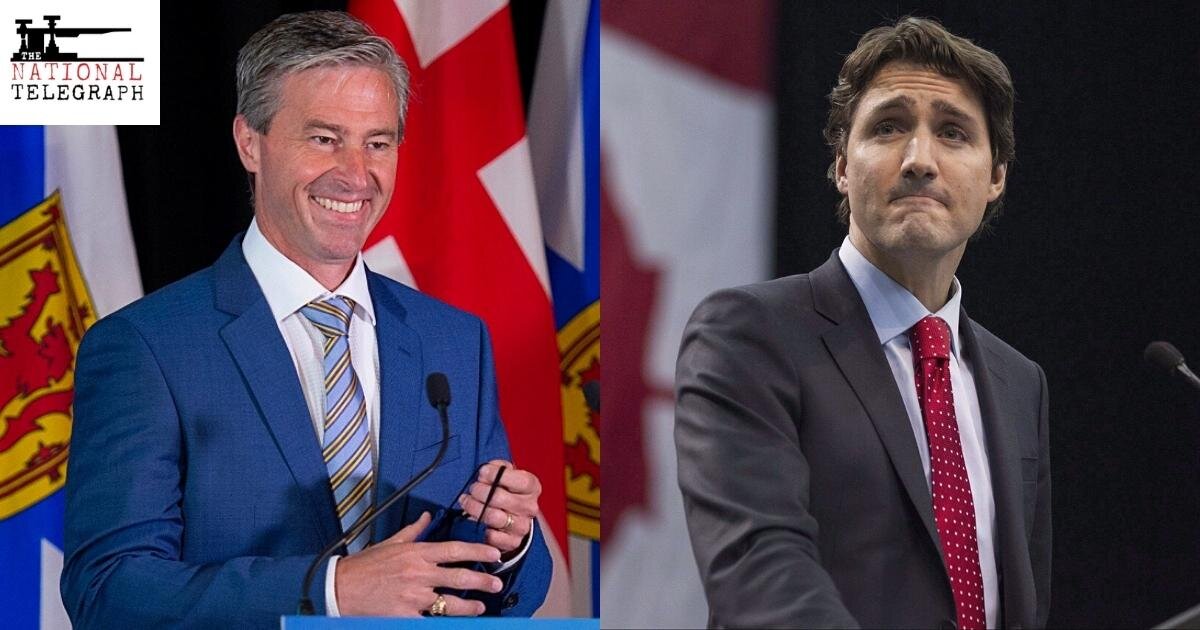Written By Wyatt Claypool, Posted on August 18, 2021

In a shocking political upset, the Progressive Conservative Party of Nova Scotia has won a 31 seat majority in the legislature of the Maritime province, in an election that the Nova Scotia Liberal Party was supposed to walk away with when the campaigning period started.
28 seats were all the PCs actually needed to win a majority, and if you include Independent candidate Elizabeth Smith-McCrossin, who was removed from the PC caucus in June 2021, the general conservative majority in the legislature is 32 seats.
These results in Nova Scotia, an assumed Liberal stronghold, should terrify Prime Minister Justin Trudeau, who just dropped the writ for a snap federal election a few days ago.
(Photo from CTV News)
Not only is this a data point that shows that Canadians, no matter how Liberal the province, at least want some political moderation away from the draconian lockdown regimes and poor economic management championed by Trudeau and his political allies, but that polling firms don’t seem to be able to identify the actual voters who plan on turning out to polling stations.
The polling aggregator 338 Canada projected that the Nova Scotia Liberals, despite falling in the polls from 45.2 percent to 39.3 by election day, were still supposed to have an 83.8 percent chance of winning the election with a 56.6 percent chance of forming a majority government. The PCs on the other hand were given only a 13.9 percent chance of winning the most seats with an insubstantial chance at forming a majority government.
Nova Scotia vote projections from 338 Canada.
Again this is not to say the polling firms’ results were somehow “fake” or that their polls were “rigged,” but what they seemed to miss in their sampling of potential voters is who actually is likely to show up to the polling stations and vote.
This election had a significantly lower turnout compared to the past three Nova Scotia provincial elections, and it seems that Liberals stayed home, but Conservatives were still motivated to go and vote to oppose the poor governance of the Liberals.
Trudeau and the federal Liberal election either are currently, or should absolutely be scrambling to see if the current federal polling or their internal polls are not accurately reflecting who will show up and vote on September 20, since they could be inadvertently running into a brick wall assuming their voters are equally interested in voting compared to Conservative Party, NDP, or Bloc Québécois voters.
The Liberals are already slumping in the polls since Trudeau announced the snap election, which should make them fear that a Nova Scotia-like scenario may result in the federal election. In fact, the Nova Scotia Liberals were projected at having a better chance at a majority government than the federal Liberals who currently only have a 38.7 percent chance at achieving a majority.
Federal election vote projections from 338 Canada.
This is not to say that Erin O’Toole and the Conservative Party have a good chance of forming a minority or majority government, but it indicates that Trudeau’s gambling for a majority government could result in just a few seats gained or lost by the Liberal Party, sticking them back in another minority government, with likely waning public approval from election fatigue.
The Conservative seats in the Maritimes may also be much safer than the polling companies currently indicate, meaning the Liberals’ path to a majority may be a very uncomfortable tight-rope walk for Justin Trudeau, who on a personal level is already having a hard time connecting with voters.
The Liberal campaign is confronted by some protestors at a campaign stop in Coburg. They are yelling about freedom and vaccines as Trudeau speaks. There is swearing in this video. pic.twitter.com/bQYlG0DN50
— David Cochrane (@DavidWCochrane) August 17, 2021
At the very least the results from the Nova Scotia provincial election are going to make the federal election far more hotly contested, as all parties are going to scramble to put more campaign resources in ridings they previously did not believe they had a good chance at winning, or losing, as pollsters don’t seem to be able to gauge how likely their respondents are to actually go out and vote.
Wyatt is a student at Mount Royal University, where he is the president of its Campus Conservative club. In his writing, he focuses on covering provincial and federal politics, firearms regulation, and the energy sector. Wyatt has also previously written for The Post Millennial.
Very well presented. Every quote was awesome and thanks for sharing the content. Keep sharing and keep motivating others.